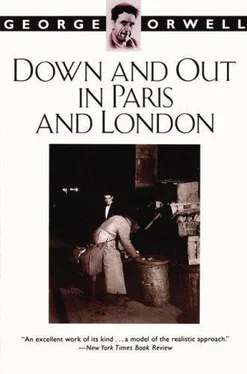George Orwell - Down and Out in Paris and London
Здесь есть возможность читать онлайн «George Orwell - Down and Out in Paris and London» весь текст электронной книги совершенно бесплатно (целиком полную версию без сокращений). В некоторых случаях можно слушать аудио, скачать через торрент в формате fb2 и присутствует краткое содержание. Жанр: Старинная литература, на русском языке. Описание произведения, (предисловие) а так же отзывы посетителей доступны на портале библиотеки ЛибКат.
- Название:Down and Out in Paris and London
- Автор:
- Жанр:
- Год:неизвестен
- ISBN:нет данных
- Рейтинг книги:5 / 5. Голосов: 1
-
Избранное:Добавить в избранное
- Отзывы:
-
Ваша оценка:
- 100
- 1
- 2
- 3
- 4
- 5
Down and Out in Paris and London: краткое содержание, описание и аннотация
Предлагаем к чтению аннотацию, описание, краткое содержание или предисловие (зависит от того, что написал сам автор книги «Down and Out in Paris and London»). Если вы не нашли необходимую информацию о книге — напишите в комментариях, мы постараемся отыскать её.
Down and Out in Paris and London — читать онлайн бесплатно полную книгу (весь текст) целиком
Ниже представлен текст книги, разбитый по страницам. Система сохранения места последней прочитанной страницы, позволяет с удобством читать онлайн бесплатно книгу «Down and Out in Paris and London», без необходимости каждый раз заново искать на чём Вы остановились. Поставьте закладку, и сможете в любой момент перейти на страницу, на которой закончили чтение.
Интервал:
Закладка:
By the same author
BURMESE DAYS COMING UP FOR
AIR HOMAGE TO CATALONIA
THE LION AND THE UNICORN
ANIMAL FARM
CRITICAL ESSAYS
NINETEEN EIGHTY-FOUR
DOWN AND OUT IN
PARIS AND LONDON
BY
GEORGE ORWELL
" O scathful harm, condition of poverte ! "
CHAUCER
LONDON
SECKER & WARBURG
1949
Martin Secker & Warburg Ltd. 7 John Street, Bloomsbury, London, W.C.
First published (Gollancz), January
1933 New edition, reset, 1949
MADE AND PRINTED IN GREAT BRITAIN by MORRISON
AND GIBB LTD., LONDON AND EDINBURGH
I
THE Rue du Coq d'Or, Paris, seven in the morning.
A succession of furious, choking yells from the street.
Madame Monce, who kept the little hotel opposite mine,
had come out on to the pavement to address a lodger on
the third floor. Her bare feet were stuck into sabots and
her grey hair was streaming down.
Madame Monce: « Salope! Salope!
How many times
have I told you not to squash bugs on the wallpaper? Do
you think you've bought the hotel, eh? Why can't you
throw them out of the window like everyone else?
Putain!
Salope! »
The woman on the third floor: « Vache
! »
Thereupon a whole variegated chorus of yells, as
windows were flung open on every side and half the
street joined in the quarrel. They shut up abruptly ten
minutes later, when a squadron of cavalry rode past and
people stopped shouting to look at them.
I sketch this scene, just to convey something of the
spirit of the Rue du Coq d'Or. Not that quarrels were the
only thing that happened there-but still, we seldom got
through the morning without at least one outburst of
this description. Quarrels, and the desolate cries of
street hawkers, and the shouts of children chasing
orange-peel over the cobbles, and at night loud singing
and the sour reek of the refuse-carts, made up the
atmosphere of the street.
It was a very narrow street-a ravine of tall, leprous
houses, lurching towards one another in queer atti-
tudes, as though they had all been frozen in the act of
collapse. All the houses were hotels and packed to the
tiles with lodgers, mostly Poles, Arabs and Italians. At 5
the foot of the hotels were tiny bistros, where you could be
drunk for the equivalent of a shilling. On Saturday nights
about a third of the male population of the quarter was
drunk. There was fighting over women, and the Arab
navvies who lived in the cheapest hotels used to conduct
mysterious feuds, and fight them out with chairs and
occasionally revolvers. At night the policemen would
only come through the street two together. It was a fairly
rackety place. And yet amid the noise and dirt lived the
usual respectable French shopkeepers, bakers and
laundresses and the like, keeping themselves to
themselves and quietly piling up small fortunes. It'was
quite a representative Paris slum.
My hotel was called the Hôtel des Trois Moineaux. It
was a dark, rickety warren of five storeys, cut up by
wooden partitions into forty rooms. The rooms were
small and inveterately dirty, for there was no maid,
and Madame F., the patronne, had no time to do any
sweeping. The walls were as thin as matchwood, and
to hide the cracks they had been covered with layer
after layer of pink paper, which had come loose and
housed innumerable bugs. Near the ceiling long lines
of bugs marched all day like columns of soldiers,
and at night came down ravenously hungry, so that
one had to get up every few hours and kill them in
hecatombs. Sometimes when the bugs got too bad
one used to burn sulphur and drive them into the
next room; whereupon the lodger next door would
retort by having his room sulphured, and drive the
bugs back. It was a dirty place, but homelike, for
Madame F. and her husband were good sorts. The
rent of the rooms varied between thirty and fifty
francs a week.
The lodgers were a floating population, largely
foreigners, who used to turn up without luggage, stay
a week and then disappear again. They were of every
trade-cobblers, bricklayers, stonemasons, navvies,
students, prostitutes, rag-pickers. Some of them were
fantastically poor. In one of the attics there was a
Bulgarian student who made fancy shoes for the Ameri-
can market. From six to twelve he sat on his bed, making
a dozen pairs of shoes and earning thirty-five francs; the
rest of the day he attended lectures at the Sorbonne. He
was studying for the Church, and books of theology lay
face-down on his leather-strewn floor. In another room
lived a Russian woman and her son, who called himself
an artist. The mother worked sixteen hours a day,
darning socks at twenty-five centimes a sock, while the
son, decently dressed, loafed in the Montparnasse cafés.
One room was let to two different lodgers, one a day
worker and the other a night worker. In another room a
widower shared the same bed with his two grown-up
daughters, both consumptive.
There were eccentric characters in the hotel. The Paris
slums are a gathering-place for eccentric people -people
who have fallen into solitary, half-mad grooves of life and
given up trying to be normal or decent. Poverty frees them
from ordinary standards of behaviour, just as money frees
people from work. Some of the lodgers in our hotel lived
lives that were curious beyond words.
There were the Rougiers, for instance, an old, ragged,
dwarfish couple who plied an extraordinary trade. They
used to sell post cards on the Boulevard St. Michel. The
curious thing was that the post cards were sold in sealed
packets as pornographic ones, but were actually photo-
graphs of chateaux on the Loire; the buyers did not discover
this till too late, and of course never complained. The
Rougiers earned about a hundred francs a week, and by
strict economy managed to be always half
starved and half drunk. The filth of their room was
such that one could smell it on the floor below. Accord-
ing to Madame F., neither of the Rougiers had taken off
their clothes for four years.
Or there was Henri, who worked in the sewers. He
was a tall, melancholy man with curly hair, rather
romantic-looking in his long, sewer-man's boots.
Henri's peculiarity was that he did not speak, except for
the purposes of work, literally for days together. Only a
year before he had been a chauffeur in good employ and
saving money. One day he fell in love, and when the girl
refused him he lost his temper and kicked her. On being
kicked the girl fell desperately in love with Henri, and
for a fortnight they lived together and spent a thousand
francs of Henri's money. Then the girl was unfaithful;
Henri planted a knife in her upper arm and was sent to
prison for six months. As soon as she had been stabbed
the girl fell more in love with Henri than ever, and the
two made up their quarrel and agreed that when Henri
came out of jail he should buy a taxi and they would
marry and settle down. But a fortnight later the girl was
unfaithful again, and when Henri came out she was with
child. Henri did not stab her again. He drew out all his
savings and went on a drinking-bout that ended in
another month's imprisonment; after that he went to
work in the sewers. Nothing would induce Henri to talk.
Читать дальшеИнтервал:
Закладка:
Похожие книги на «Down and Out in Paris and London»
Представляем Вашему вниманию похожие книги на «Down and Out in Paris and London» списком для выбора. Мы отобрали схожую по названию и смыслу литературу в надежде предоставить читателям больше вариантов отыскать новые, интересные, ещё непрочитанные произведения.
Обсуждение, отзывы о книге «Down and Out in Paris and London» и просто собственные мнения читателей. Оставьте ваши комментарии, напишите, что Вы думаете о произведении, его смысле или главных героях. Укажите что конкретно понравилось, а что нет, и почему Вы так считаете.












